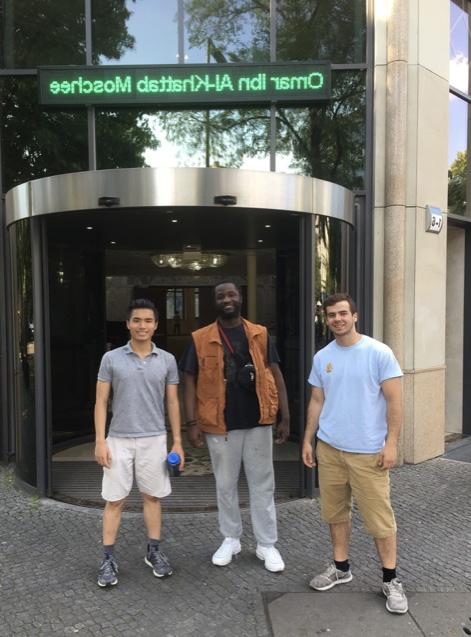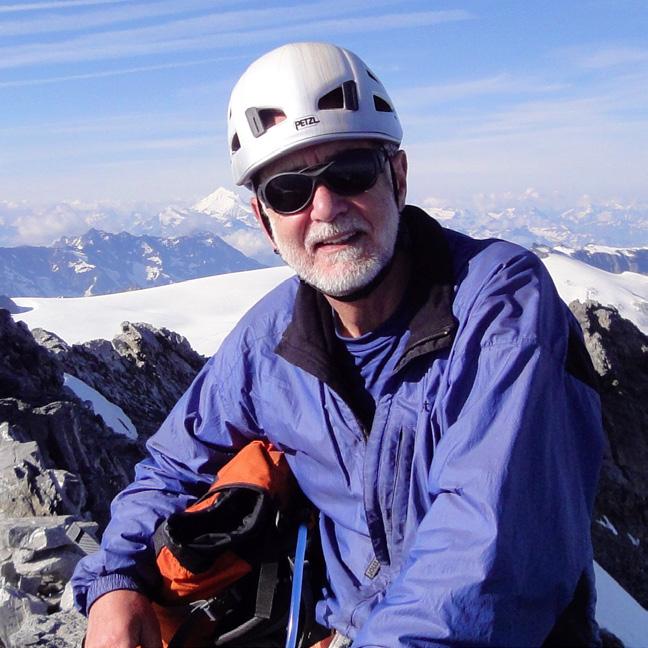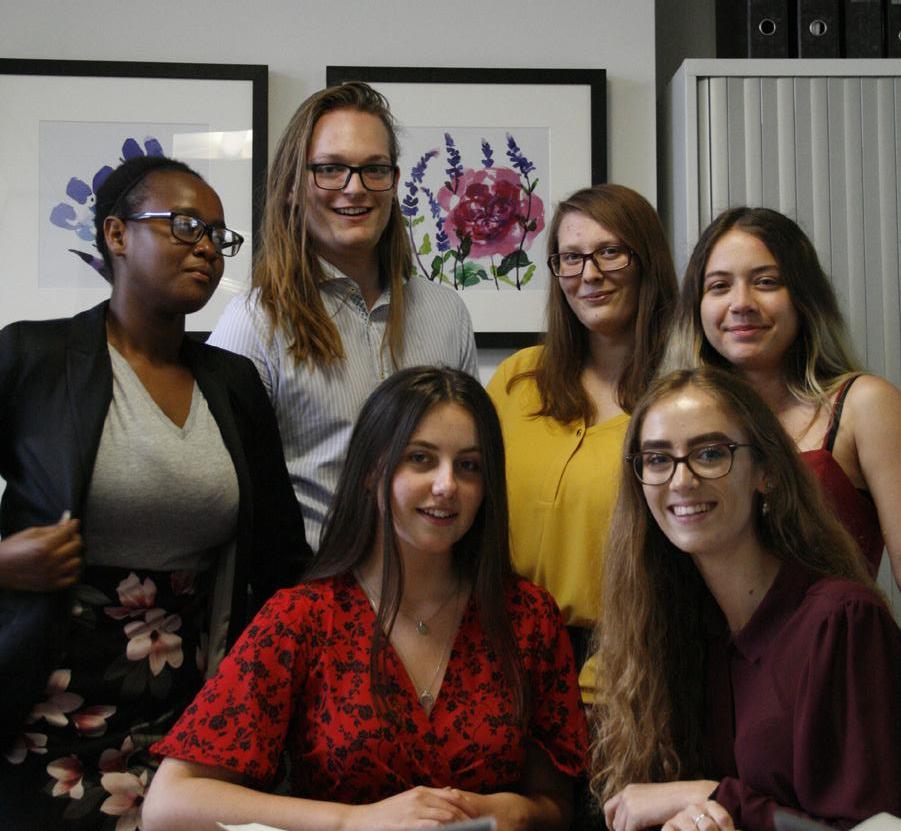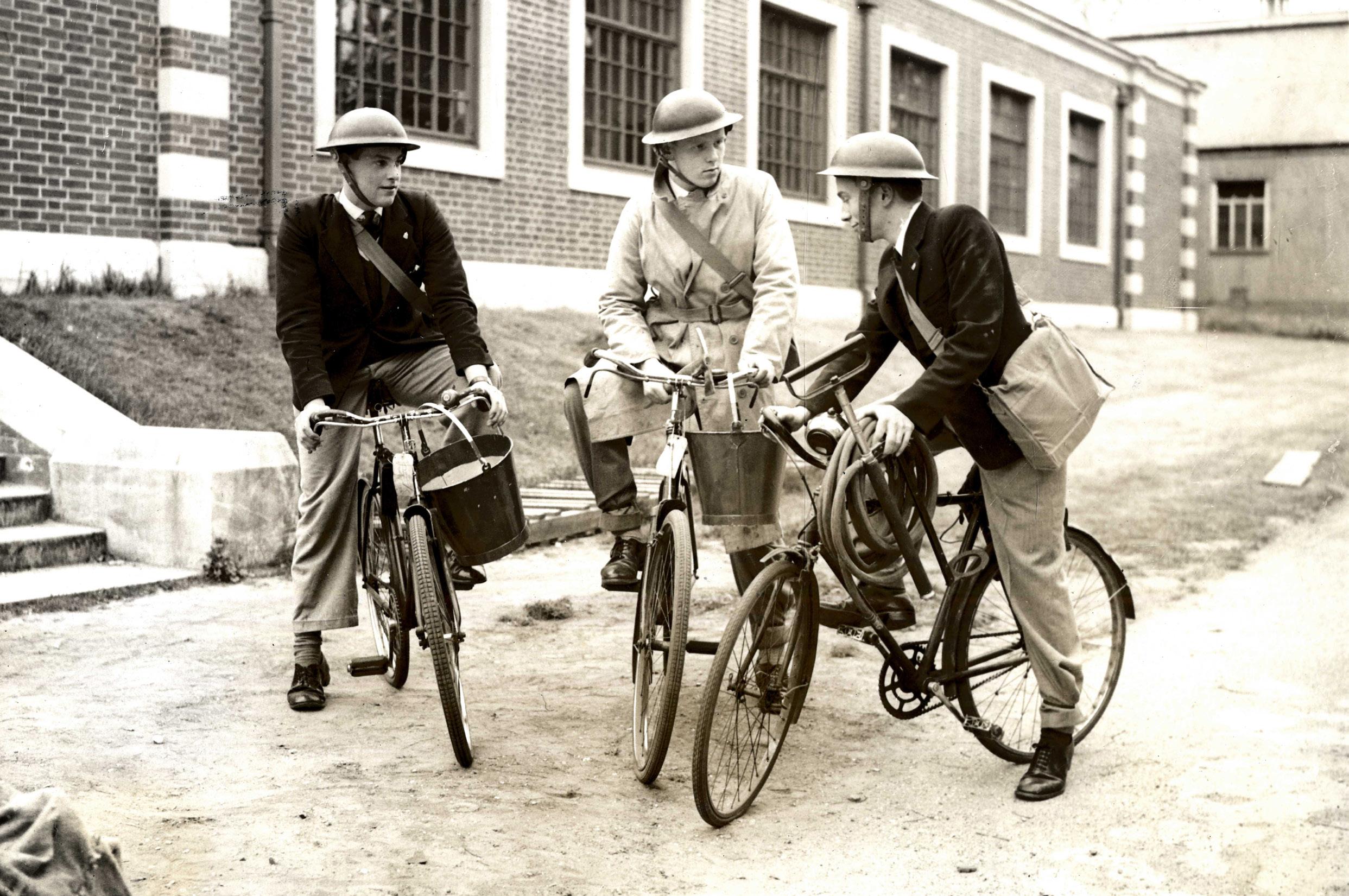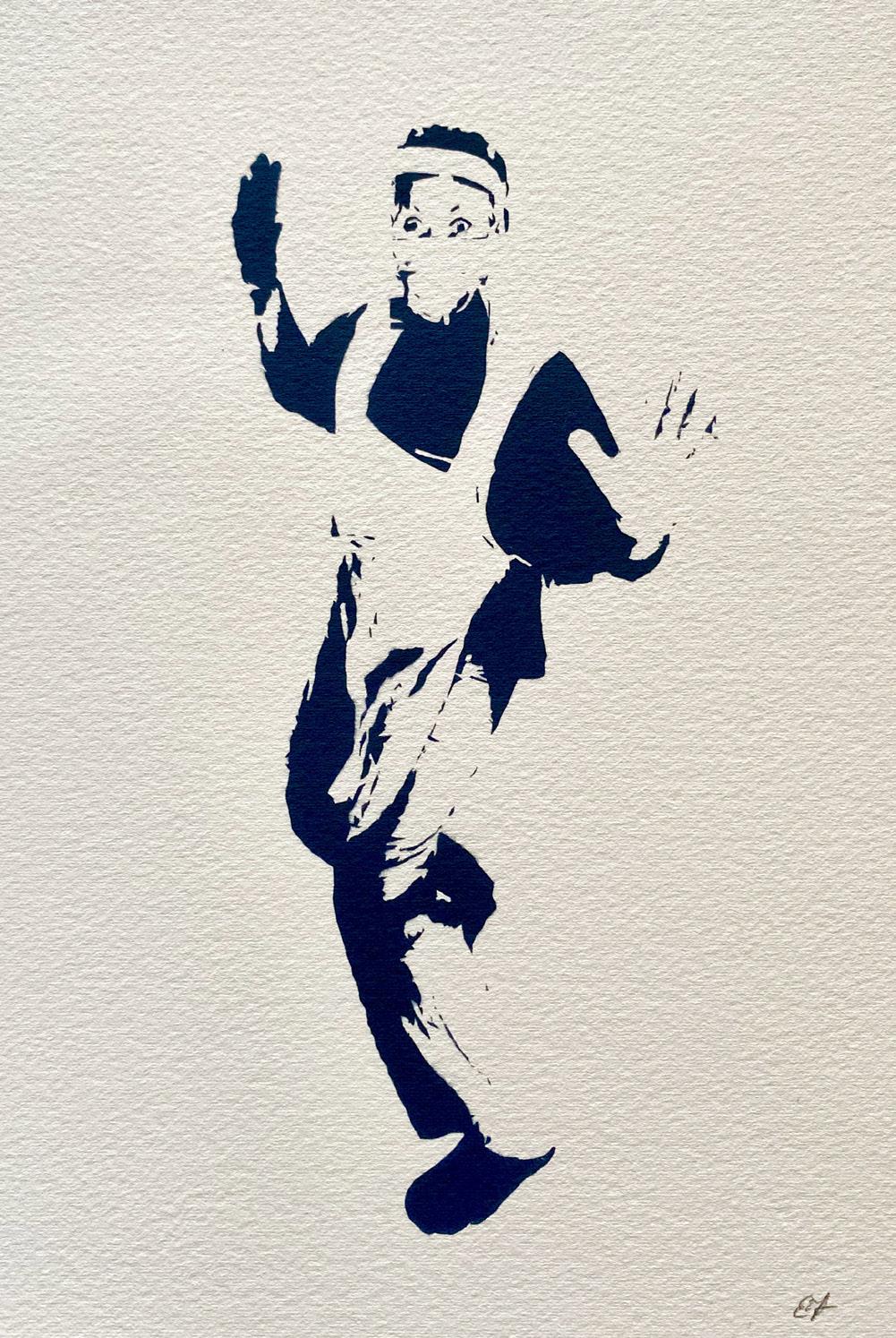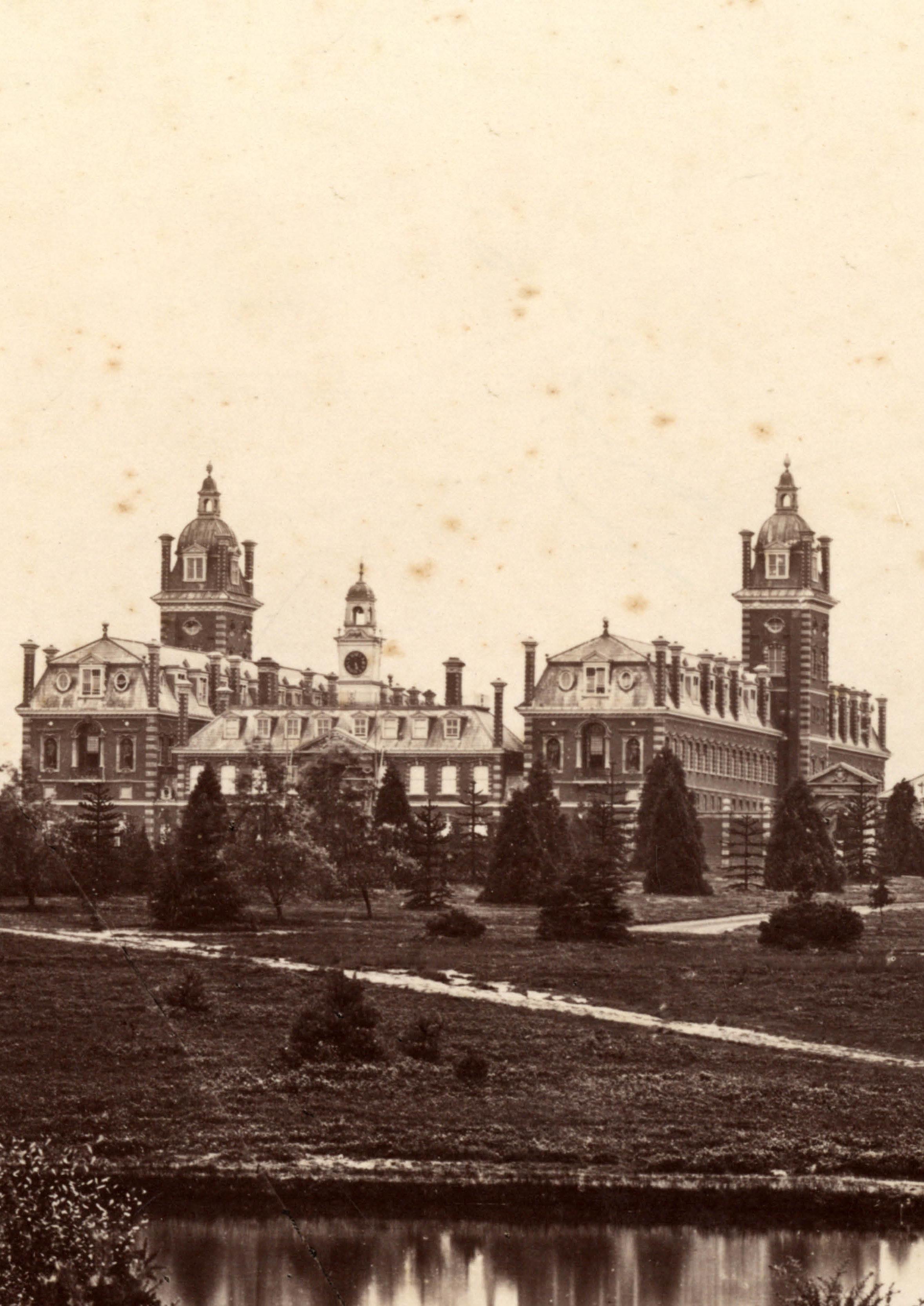
29 minute read
Academic Reports
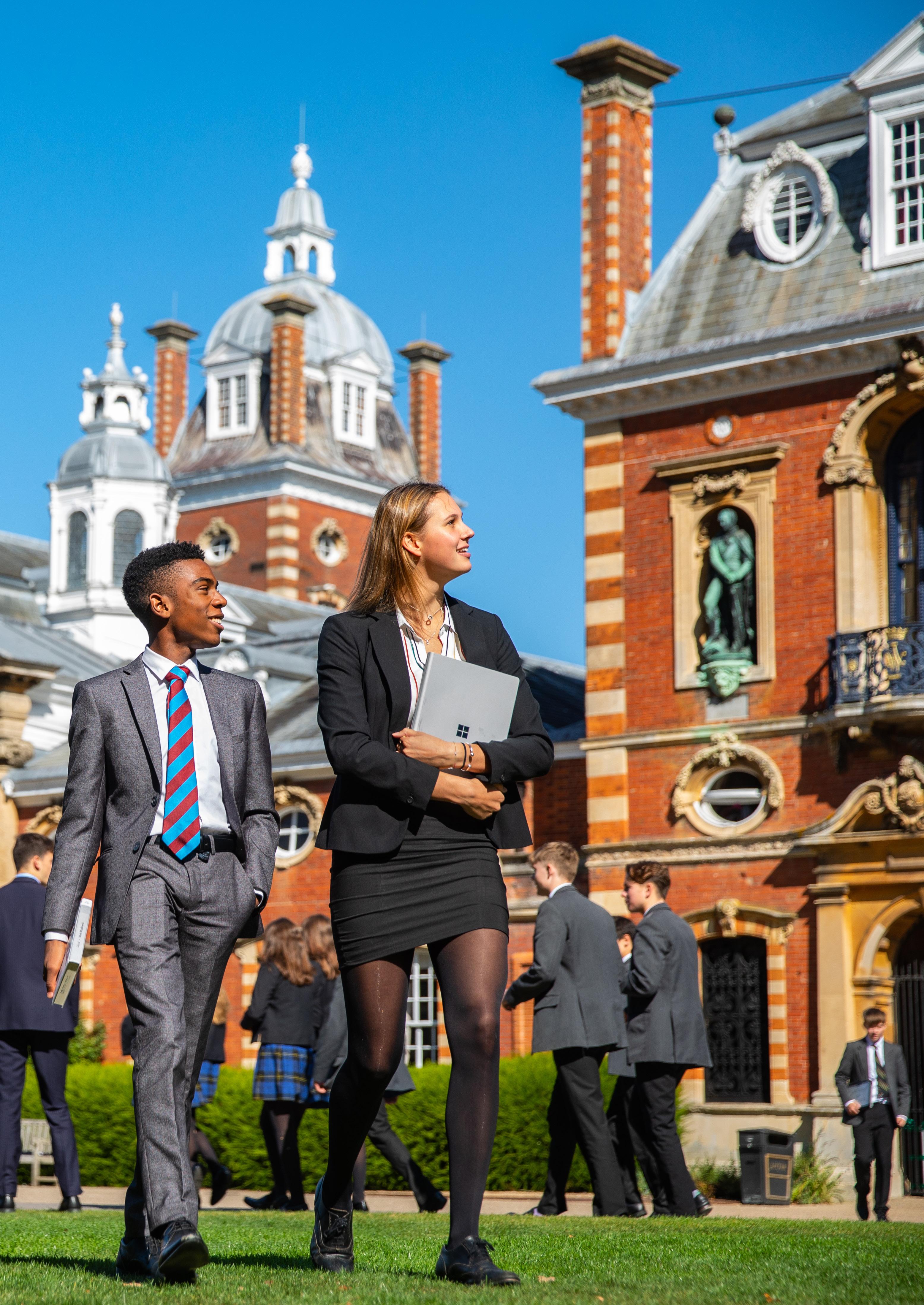
As galleries and museums across the globe have been forced to close their doors, one thing is for certain: the art world has irrevocably changed. Art organisations have turned to promoting art through online viewing rooms, virtual exhibitions, and studio tours. Welly Art School has been no exception. Our pupils have embraced online learning, and we couldn’t be prouder of their creative output over the lockdown period. In addition to the transition to online learning, we have been impressed by the volunteering efforts of our students and staff, making scrubs and face masks for local hospitals. Great art is always produced during times of uncertainty and change, and we can’t wait to see what the next generation of artists will come up with.
Advertisement
Master’s Scholarships were introduced this year and awarded to Lower Sixth pupils who have demonstrated genuine enjoyment, appreciation, and involvement in art across the College. Congratulations to Emma Perei (A), James Ellwood (R), and Nancy Lindo (W) who have all shown outstanding commitment to the subject. Students in the Third Form who were awarded scholarships this year are: Duncan Stewart (Bd), Nikki Carcelle (Hl), Sophie de Montaignac (A), and Isabella Webb (Hn). The selection process was incredibly difficult, and we had a record number of applicants. Every individual demonstrated commitment above and beyond our expectations, and the future of the Art Department will be bright for years to come. We are extraordinarily proud of the range of talent across the pupil body, and the enthusiasm for the arts that all our pupils share. A collection of their work can be viewed on our Instagram page @wellyartschool.
We were lucky enough to have an incredibly keen and talented group of Art students in the Upper Sixth this year, and although we are sad to see them go, we are so proud of their achievements. Seventeen students have been accepted into top Art Foundation courses, while several others are moving on to fantastic universities to pursue degrees in Fine Art, Photography, Fashion, Visual Culture, and Art History.
Art History
It has been a thriving year for the History of Art Department with many highlights, including an A Level trip to Tate Britain and All Saints Margaret Street church in London. The IB cohort enjoyed an inspiring study day with our visiting speaker Mrs Orpen-Smellie. Art History remains a popular subject in the Sixth Form, and the Art Historians have engaged enthusiastically with cocurricular and extension opportunities, such as the History of Art reading group and ‘pub quiz’ evening in the V&A café. In the Summer Term, the Fifth Form and Upper Sixth immersed themselves in the transition to online teaching, and each year group curated their own ‘virtual exhibition’ based on the representation of the nude. In the lower school, members of the Third Form learnt about the College’s art and architecture as part of the Enrichment programme, while Fourth Form students discovered the power of storytelling in Gericault’s The Raft of the Medusa in an introductory workshop.
Biology
It has been another busy and exciting year for Wellington biologists, both in and out of the classroom. One teaching initiative the department embarked on this year was to redesign our A Level course in the Harkness style. This has placed an emphasis on pre-reading and student-led discussion. In February we had a visit from Townley Chisolm, a fellow Biology teacher from Philips Exeter Academy in the US. Coming from the home of Harkness, Townley was able to offer us invaluable advice on the design and delivery of our new course. In January, our Lower Sixth A Level biologists had an excellent trip to the Gloucester University science labs, hosted by Professor Adam Hart. They were able to conduct a number of experiments that would be impossible to do in a school science lab, including one looking at pheromone scent trails and communication in leaf-cutter ants.
We have had many fantastic speakers visiting the school, including Dr Matthew Gollock of the ‘Zoological Society of London’, who delivered an inspiring talk on marine conservation to the College Science Society. The Wednesday afternoon dissection club has also gone from strength to strength, led superbly by Lower Sixth students Jaimie Lau (Ap) and Titus Song (M). Wellington students have again had success in competitions run by the Royal Society of Biology, with Blake Keijsers (L) achieving a Gold, and eight further students receiving Bronze and Silver awards. An amazing twelve lower school students achieved Gold awards in the Lower School Biology Challenge. The student-led medical society has been particularly active this year, organising several fascinating sessions, including learning the basics of suturing on bananas and conducting an investigation testing the efficacy of a deep-cleaning product. Finally, it has been a bumper year for veterinary medicine applicants, with all four students who applied receiving offers from UK universities.
Chemistry
Firstly, well done to Nik Lebedenko (S), Robbie Skinner (Hl), and Yusuke Osawa (Hg) who all achieved Gold in the Chemistry Olympiad for 2020. Impressively, a further eleven students achieved Silver, and twelve students achieved Bronze, with excellent scores from Alex Crosby (R) and Monty Cross (L).
Sophie Hodge (W), Dewi Simons (L), Jessica Yang (O), and Poppy Leventon (C) formed the Wellington College team entered for ‘Top of the Bench’ at Oxford University in November. The team produced an excellent poster explaining their choice of the most important element in the periodic table, as well as taking part in a practical chemistry task at the event.
Our Lower Sixth chemists who form the Ionic Liquids research group have been extremely busy this year. During the Michaelmas Term, they visited UCL to meet PhD students and academics who focus their research on ionic liquids. They enjoyed the experience of using the facilities to analyse their own samples, and the chance to discuss their research ideas with experts in the field. Well done to Bwalya Kapapa (Hg), Arthur Akopyan (M), Alex Crosby (R), Moritz Bentheim (Bn), and Ethan Distelbrink (M) for making such a great impression. In the Lent Term, a poster of their research was also presented at the ‘Tonbridge Science Festival’, with the poster being well received and attracting a range of thought-provoking questions from the audience.
During the Summer Term, the Third Form have been carrying out practical investigations at home and filming their efforts. Well done to Poppy Leventon (C) and Anna Rantakari (W) who won a prize for producing an excellent video investigating how to make a safe bath bomb which gives off plenty of bubbles.

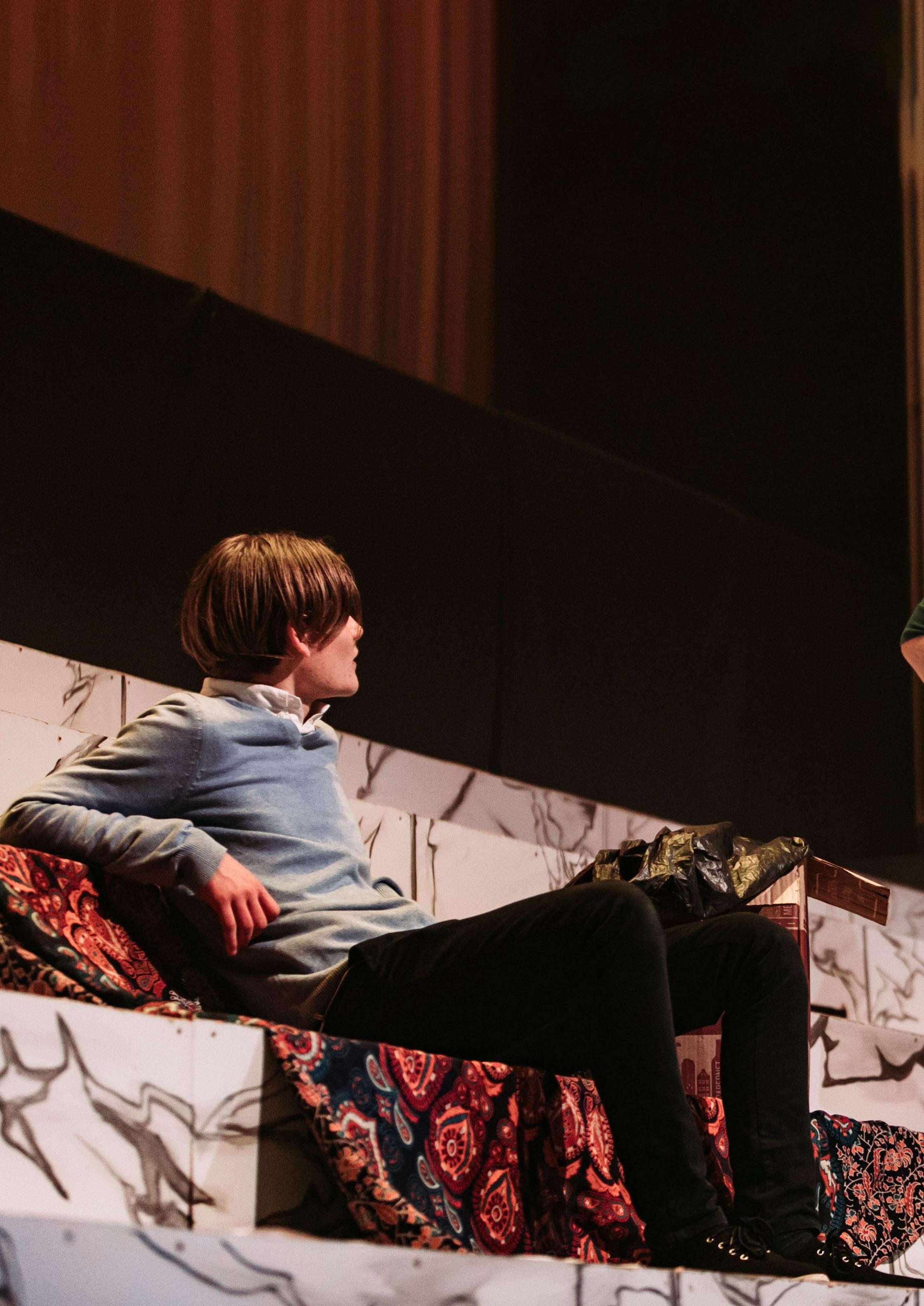
In one of the most famous (and disputed) lines of The Aeneid, Aeneas tells his exhausted and shipwrecked Trojan followers: “forsan et haec olim meminisse iuvabit” (perhaps one day it will even be pleasing to look back on these moments). As we continue in Corona-limbo, having lost the third term, we can only hope.
But writing this article has caused me to look back and remember happily many of the thriving curricular and extra-curricular events in the life of the department. The year had barely started, and four students were still receiving their reports from Bryanston Greek summer school when surely the most ambitious EPQ ever was completed — Medea The Musical, written, produced, and directed by, and starring, Hayley Canham (O). The musical perfectly updated the Greek tragedy to peel back the layers of the ideal family and show misery and betrayal spiralling down to its famous denouement. Hayley completed a great term by receiving an offer from Cambridge to study Classics next year. Our collaboration with Edgbarrow School to teach Latin GCSE has continued to flourish, with 53 students spread across four classes and involving six Wellington Lower Sixth teaching assistants. A number of students took part in the ‘UK Linguistics Olympiad’, with the highlight being the two Gold awards in the intermediate category.
The Classics Society has had some memorable moments this year. Professor Gesine Manuwald (UCL) opened up some of the rhetoric of Cicero’s Philippics. Dr Llewelyn Morgan (Brasenose, Oxford) came to judge the Verse Reading competition in November and was persuaded to perform some Virgil from his current show. In January, it was the department’s turn, with the annual Classics debate this year asking, ‘who was the worst Roman emperor?’ with Domitian pipping Nero and Caligula to the unwanted title. In February, we were on the road to watch The Frogs at UCL (updated to include the horrors of journeying on the Tube) and visit the British Museum, and we welcomed a Roman centurion who drilled our prep school visitors like Roman soldiers.
Members of the department have also been active in writing. Simon Allcock produced a commentary on Plato’s Symposium and Rob Cromarty on Tacitus’ Annals IV (both Bloomsbury); Emma Ramsey had an article published: Apuleius Philosophus Platonicus? Apuleius’ self-presentation in the Apologia; and Matthew Johncock reviewed In the Orbit of Love by David Konstan for Classical Review.

DET
A new lease of life was given to the department over the summer with a full workshop refurbishment. The open plan feel, along with new benches and machines, was most certainly welcome, but the most notable change meant that the carpet floor was no more! Another very welcome addition was the Resin SLA 3D printer, which now means the pupils are able to make production quality prototypes, something the GCSE and Sixth Form pupils made full use of this year.
Whatever stage they reached, I hope all the exam group pupils are especially proud of what they achieved this year; there were many innovative designs and a number of pieces and ideas that would not have looked out of place at a Degree level show. For our leavers, it is always pleasing to see so many go on to further studies in the Design, Engineering, and Architecture fields — and to hear some are already part of a design team tackling problems relating to Trace and Track is very exciting.
Of course, a large part of any DET department is what the pupils design and manufacture over the year. While the Third Form pupils were not impacted hugely by the departure from the College site, having designed, modelled, and manufactured various projects, I think they welcomed the chance to design a new boarding House using a little-known computer aided design programme called Minecraft! Strangely, it was sometimes a case of the pupils teaching the staff how to use the programme, but the end results from all pupils were fantastic. The Fourth Form pupils have been equally adaptable, and with the start of their design and prototype project just in the future, they were very focused throughout the Summer Term’s virtual learning. With some excellent design briefs already underway, I think 2021 is destined to be another exciting year.
Drama
The appetite for curriculum Drama continues to go from strength to strength as Wellington College celebrates the civilizing influence of the arts and the value of the “soft skills” that are key to success in all areas of our lives. Self-confidence, communication skills, and emotional intelligence are nurtured in the drama classroom, and serve us long past our GCSEs. The number of pupils taking Drama at Wellington has continued to grow, with over 90 pupils opting to take the subject in Third Form, and 50 students studying the subject at GCSE across the Fourth and Fifth Forms. We continue to offer both IB and A Level Theatre Studies in the Sixth Form. Our Drama students have benefited from workshops run by leading practitioners and industry professionals, including The Wardrobe Ensemble; Berkoff specialist Annie Sutton; Gecko; Squire Stage Combat; Emma Tompkins, puppeteer; as well as having many informal opportunities to discuss vocational options with actors and directors.
Economics and Business
Although the department hasn’t had as volatile a year as the stock markets, we have still had our fair share of adventures. We waved goodbye to our Head of Department, who headed down under to spend a year teaching Economics in Sydney. As if by magic, Mr Wood joined us from South Korea and is sadly now heading off to Dubai — his economic memes, outstanding magic tricks, and wonderful teaching will be sorely missed. To complete the globalisation of the department, Mr Adams joined us (virtually) from New Zealand, and has been embracing the time difference, teaching lessons online at 2 am. That’s how much he loves business!
The Lower Sixth started a new society to help introduce the younger years to the department, and the Disrupt team arranged a plethora of fantastic speakers, including the founder of FeverTree, OW Tim Warrillow. We also joined with partnership schools to hear the Bank of England explain how they regulate the banking sector.
As the school went virtual, we started up online current affairs briefings. These Coronanomics sessions had over a hundred students attending at one point and gave us a chance to debate the unprecedented events taking place across the global economy. As the Fifth Form joined the department for their bridging course, we started an online trading game with 180 students competing to establish who the best hedge fund manager is. Our Upper Sixth winner managed to increase their portfolio by 48% in six weeks! Our only regret as a department... that we didn’t act on our instinct to fill the outdoor pool with oil when prices briefly dipped into the negative. We could have made a fortune!

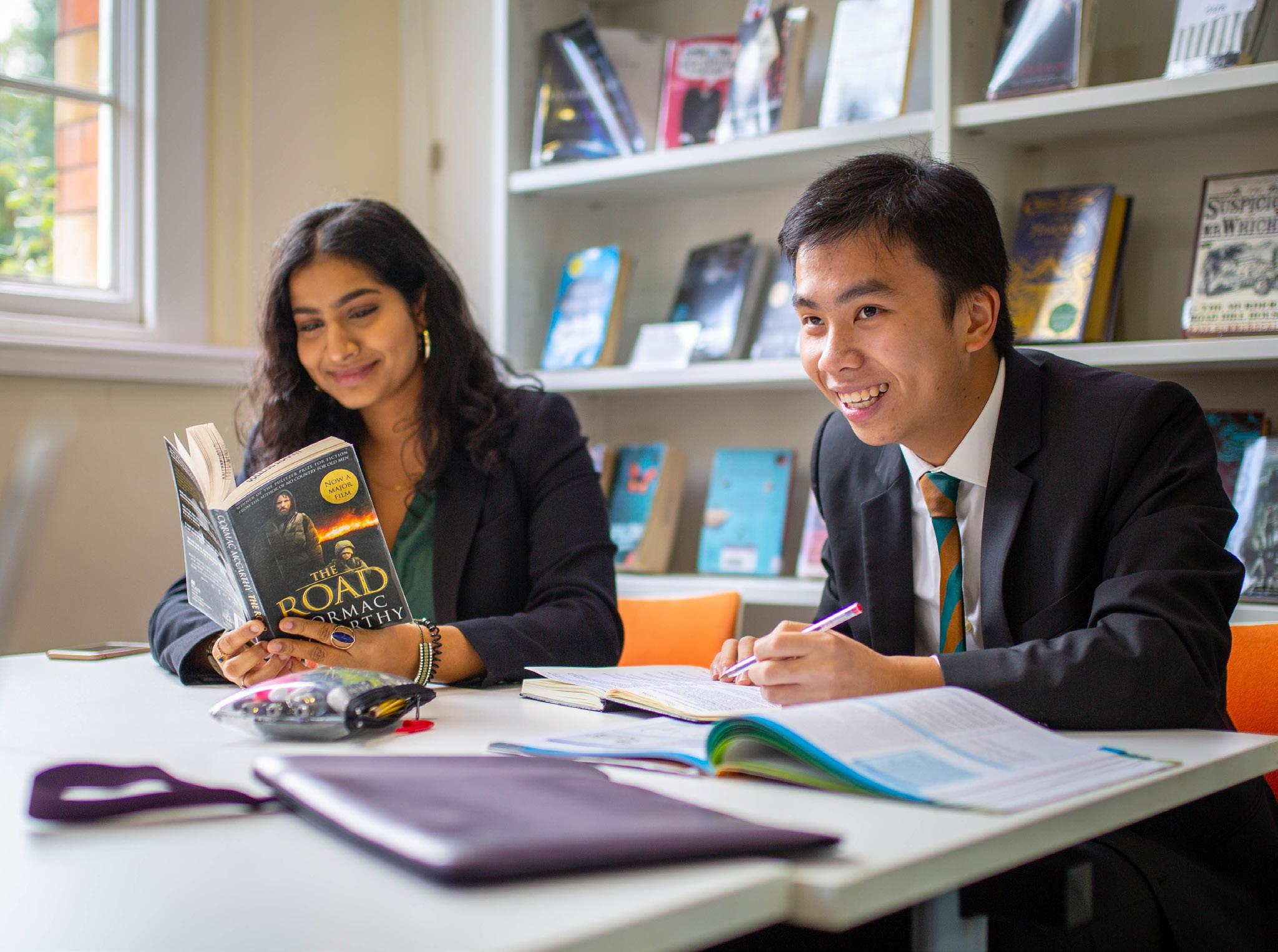
English
The most memorable event and achievement of the English Department in the first part of this academic year has been the first edition of the Re-Thinking Boundaries student conference. We welcomed a range of pupils from different schools, as speakers or as part of the student panel. Highlights of the event included the keynote address by Professor Anthony Beale of Birkbeck University; the Othello poetry workshop led by Rakaya Fetuga of the Octavia Collective; and teacher and student-led talks and seminars. These talks engaged with the idea of ‘boundaries’ in terms of both their literal and metaphorical implications, such as tropes in literature, aspects of linguistics, and even physical boundaries, such as those crossed by medieval thinker and nun, Margery Kempe.
The English Department also welcomed spoken word artist Rakaya Fetuga for a poetry workshop and assembly performance earlier in the Michaelmas Term, in celebration of National Poetry Day. Rakaya led small mixed-age groups of pupils through memorable poetry workshops on identity and self-expression.
English students have also enjoyed and celebrated a variety of other extension and enrichment academic or creative activities, such as the ever-stronger LitSoc, Public Speaking, the Creative Writing Group, CakeSpeare, and taking part in poetry, short-story, and essay competitions, both internally and externally. All of these have continued strongly, even in their virtual format in the latter part of the year!
Geography
It has been a successful year on the academic front, with over 50 students taking the subject in the Sixth Form and many going on to study or planning to study geography-related degrees, including Lucas Evans (Pn), who received an offer to read Geography at Oxford. Highlights of the cocurricular programme include an A Level masterclass on the geography of ‘Space and Place’ delivered by Dr Simon Oakes, and the inaugural Earthshot Competition to address contemporary global challenges, which was attended by students across all year groups. Guy Zilberman (R) was highly commended by the judges of the ‘Royal Geographical Society’ and ‘Financial Times Essay Competition’ addressing the question, ‘Is it better for the world to be wealthier or to be more equal?’ Students have also entered a range of other external competitions, including the ‘Warwick University Global Sustainable Development Essay’ and the ‘Fitzwilliam Land Economy Essay’. This year was also a busy one on the fieldwork front. In the Michaelmas Term, the Fifth Form enjoyed a superb day of coastal fieldwork in Christchurch Bay, while the IB cohort went further afield in the Lent Term to research changing river characteristics on the River Tordera near Barcelona. A Level students visited the Jurassic Coast in Dorset to undertake a range of fieldwork skills in preparation for their independent investigations. Next year we will continue to broaden our offering of extension and enrichment opportunities within the department; there has arguably never been a more important time to be studying Geography.
History
Though disrupted by Covid-19 and the cancellation of some of the usual highlights of the department’s calendar, such as our Berlin and Battlefields trips, the extra-curricular life of the department has been as vibrant as ever. Over 20 Lower Sixth pupils entered this year’s Essay Competition, judged by Professor Helen Berry. They deserve much praise for their ambition and efforts, with special mention going to the finalists: Rulan Zhang (Hg), Seb Batchelor (Bn), John Hatton (Bd), Sareena Austin (Hg), and the ultimate winner, as announced at a formal dinner for all involved, Harry Taylor (T). A group of pupils met throughout Michaelmas at our ‘What is History?’ book club to explore the nuances of the subject in the company of cake and biscuits, while members of a History Department panel was put through their paces by an inquisition of Fifth Form historians — that is not the correct collective noun, but it should be! Indeed, the correct collective noun is an argumentation (true!), and this was amply demonstrated in our series of post-lockdown online department debates, streamed to all four corners of the globe, and covering such topics as the turning points of World War Two, the most significant decade of the 20th century, who or what was to blame for the Cold War, and asking ‘Was the battle of Waterloo all that significant?’ (Answer? No). Good-humoured, highly intelligent, and occasionally bruising — these debates will certainly become a permanent feature of department life as we move forward into the future.
Maths
At the very moment the school’s closure was announced in March, a number of our students were just about to sit Intermediate Olympiad papers — and whilst to some the cancellation of a two-hour maths exam might seem far from disappointing, for our keen problem-solvers it was certainly a disappointment for them not to have the opportunity to demonstrate the skills that had already earned them a collection of Gold Certificates in the UKMT Maths Challenge. Before lockdown, however, we were at least able to celebrate success in the British Mathematical Olympiad — a gruelling three-and-a-half-hour marathon in which Nik Lebedenko (S) gained a Distinction and Yusuke Osawa (Hg) gained a Merit. That said, what Covid-19 may have taken away in terms of competition, it certainly gave back in terms of mathematical interest — there was plenty of opportunity to tackle questions on exponential growth and the statistics of assessment as the summer of digital teaching progressed.
Extension took a range of forms, as ever, with the department running its popular series ’The Magic of Mathematics‘ — a set of masterclasses for parents — on Saturday mornings. In addition, the department hosted the Advanced Mathematics Support Programme fortnightly throughout Michaelmas and Lent. The AMSP is a national body aiming to improve engagement with maths at sixth form level and beyond; the workshops held here were designed to support local Sixth Form students with an interest in maths and mathematical subjects at university and (in addition to problem solving workshops) featured a number of mock university interviews. We were delighted to hear that a number of the participants gained Oxbridge places this year.

MFL
2019/20 began very well for the MFL Department, with all the usual events, local trips, and competitions. The whole department was turned into an MFL multiplex early on in September to enable pupils to see and discuss an array of fantastic international films. Sixth Form Spanish students enjoyed the opportunity to go and see a live performance in the target language of their A Level set text by Federico García Lorca entitled, La casa de Bernarda Alba. Even more valuable for the students was the chance to interview actors and the director after the performance and gain a unique insight into their portrayal of the key characters. Students of Mandarin represented Wellington in the finals of the HSBC Mandarin Chinese Speaking Competition in London, and students of Spanish and French also enjoyed bringing their language studies to life by scripting, directing, and performing their own scenes in two national competitions.
The annual Verse Reading Competition again attracted a high number of participants across all parts of MFL and saw a wealth of accomplished recitals in seven different languages. Judges were genuinely overwhelmed by the quality of the final performances, praising the accuracy, understanding, and flair of all competitors. Plans for excursions to theatres in the Lent Term and trips abroad in the Summer Term did, however, sadly have to be postponed due to lockdown. Nevertheless, determined not to let students fall behind, the MFL team leapt into action with remote teaching in March. Exciting new programmes focusing on cinema and culture were written for Fifth and Upper Sixth classes, individual oral classes continued, and online lessons encompassed the usual rich variety of authentic materials that pupils find so engaging. Plans for September are already underway, with junior reading groups, a German outreach programme, cookery lessons, and flamenco classes all being prepared and ready for delivery in both a physical and online setting.
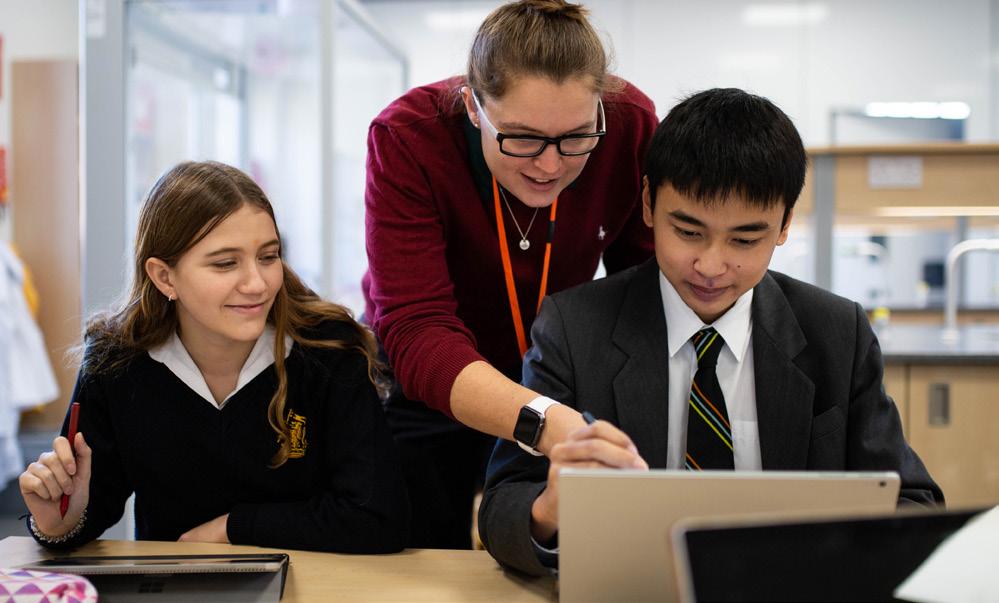
PE in Third Form continues to be the most popular elective, hardly surprising when you consider the range of activities on offer! Sports such as Basketball, Orienteering, Squash, Acro Sports Gymnastics, and Volleyball are available and all cover rules, training ideas, and give an idea of what could be expected into the GCSE course. GCSE theory aspects are also covered to engage pupils, such as understanding why and how to lead a warm-up and cool-down at the beginning and end of their sessions, and how to analyse performance.
This year has seen our largest GCSE cohort, with 75 pupils opting for PE. The practical standard has been incredibly high, as was commented on by visiting examiners to our winter standardisation. This, along with joint revision workshops, has enabled us to forge strong links with local schools, sharing best practice with our state school partners.
The Sixth Form offers two courses: A Level PE and IB Sport and Exercise Science. We have continued the tradition of visiting St Mary’s, Twickenham, and Surrey University to gain extra practical lab time. Pupils were able to use state of the art laboratory testing equipment, as well as attend lectures on sports nutrition. Not only did this enhance their knowledge, but it also gave a taster of higher education and possible degree courses.
Philosophy & Religion
In the academic year 2019/20, we began with some new décor to grace the department’s long corridor: a timeline of Philosophy and Religion. Compiled by all our teachers and designed by the excellent Josh Moses, this immense frieze in the Wellington colours testifies to the contributions that Philosophy, Theology, and the world religions have made to the sum of human existence from I Ching and the Vedas via Siddhartha Gautama, Socrates, Jesus of Nazareth, Thomas Aquinas, and Friedrich Nietzsche to the present day. We hope that it will inspire many Wellingtonians and help them to place the events of history next to the ideas that influenced them and still move the world today. We hope you will soon be able to drop in and see it. This year, we said a fond farewell to two stalwarts of P&R. Our loss of Guy Williams, sometime Head of this Department, whose quiet wisdom and immense philosophical and theological acumen will be much missed, is now the gain of Reading Bluecoat. James Ellis, a teacher beloved of his colleagues and pupils alike, also moved on to pastures new at the star t of 2020. An OW himself, James began his teaching career at Wellington in 2015 in the Drama Department, but was quickly adopted by the P&R Department, where he flourished. His charismatic, inimitable classroom presence and personal warmth, combined with always holding his pupils to the highest of standards, quickly endeared him to his pupils. James and Guy will be much missed. We were delighted, however, to be re-joined by Mrs Jessica Goves, fresh from maternity leave, and Mrs Ele Winders (neé Morley) who, after leaving Wellington to sojourn for years in the wilderness of Dulwich College, brought her many talents back to Wellington. And of course, it is also such a pleasure to have the College Chaplain in the Department again. Father Adrian brings not only theological expertise, but also as the bearer of a Philosophy degree, helps to maintain the balance with the theologians here on the ground floor of the Sebastian Faulks Building.
Physics
In September, Wellingtonians were treated to a fully refurbished and now state-of-the-art Physics Department; we also welcomed Mr Webber to the Common Room, and Physics continues to go from strength to strength. Outside the classroom, there have been a variety of exciting talks: Dr Rebecca Smethurst gave a Fireside Talk entitled ‘Astrophysics – from your lab to your living room’, Dr Jürgen Pozimski gave a talk on Hadron Cancer Therapy, and Charlie Hoy expounded on the topic of Gravitational Waves.
We enjoyed success once again with the Physics Olympiad, Nik Lebedenko (S) was particularly successful placing as one of the top 100 students in the country. Success was also enjoyed further down the school with Harry Chen (M), Alex Crosby (R), Sam Allen (R), Locky Almanza (S), Dylan Byrne (R), and Kate Sin (Ap) all attaining Gold awards and placing within the top 5% of entrants in the country. Students have also been extended with practical physics and, in the younger years, students have spent Wednesday afternoons making solid-fuel rockets and working on drag racing cars with Mr Holmes.
We will greatly miss our Upper Sixth, who graduate this year; a total of fifteen students are taking Physics or Engineering based courses at universities, including: Oxford, Cambridge, UCL, Edinburgh, Bristol and Bath. We wish them all the best in their future study.
Project Skills
The academic year started with a remarkable 590 Wellington pupils across four year-groups engaged in Project Skills courses. This was our third year offering the Higher Project Qualification, which enables all Middle School pupils to explore areas beyond the traditional curriculum. For the first time, the HPQ was completed within the Fourth Form, thus increasing focus on the project, and allowing time for more independent extension in the second GCSE year. This year’s Fifth Form created an extraordinary variety of projects, including the creation of a science fiction novella, and essays exploring the impact of Christianity upon modern society, and the effect of populism in the UK. As well as providing valuable academic extension, the skills fostered by the HPQ equip pupils for pursuing their interests in the IB Extended Essay or the Extended Project Qualification. 2019/20 was the first year in which both the Lower and Upper Sixth A Level cohorts were following the ‘3 A Levels plus EPQ’ package. The EPQ has perfectly showcased the imagination, skill, and dedication of Wellington pupils. Alongside the two outstanding prize-winning projects (Hayley Canham’s (O) production Medea The Musical and Abby Hunnings’ (C) Urban Beehive), we saw innovative business plans, undergraduate-standard essays, prosthetic make-up techniques, an investigation into waste disposal using cockroaches, and a rocket launched on Bigside. The skills learnt will not only be invaluable for university study and the world of work, but the EPQ has also opened the door for many pupils to meet their university offers, with several top universities reducing offers by a grade or two for students with an A (or sometimes even B) in EPQ. Thus, Project Skills holds an increasingly prized place at the heart of the Wellington curriculum.
Psychology
The challenges of lockdown have brought some surprisingly positive outcomes for the Psychology Department. Fifth Formers have had the opportunity to complete a bridging course and have enjoyed a varied diet of topics including: creative intelligence, animal intelligence, sleep, dreaming, and stress. During lockdown, the Upper Sixth continued to lead “Psysoc” with enthusiasm in the temporary online format. Topics investigated were “psychology behind panic”, “the minds of serial killers”, and “brain-based explanations of unusual disorders”. Dasha Geller (W) and Matilde Lasi (Hg) produced our first Psychology magazine – a Quarantine Covid-19 edition covering the topic “Is cure worse than the disease – the psychological impact of lockdown” (now available to read on the Wellington publications section of the website). The Psychology external speaker series continued to engage and inspire throughout the year. Nadia Waheed (business psychologist) shared her insight on her industry, which uses psychological traits to optimise successful job matches for clients. Dr Brigitte Wood (educational psychologist) ran a day of workshops explaining how research methods are used in her practice. Finally, Jan HarvieClark (psychoanalyst, training analyst, and supervisor for the British Psychoanalytic Association) gave her fascinating insights into the controversial topic of the unconscious mind in mental disorder, which was well received by the Upper Sixth (even in lockdown on Microsoft Teams!).We are now excited to introduce the Fourth Form to a Lower School Psychology book group, and hope they enjoy reading Phillip Zimbardo’s “The Lucifer Effect” in readiness for discussion of “How good people turn evil” in Michaelmas Term.

University Places 19/20
Finley Allington Cameron Almanza Alexander Andrews Delan Aribigbola Giovanni Auletta Armenise Anastasia Avetissian Katherine Baccanello Jolyon Baker Cordelia Bambury Arabelle Banwell William Barker Benjamin Barker-Goldie Georgia Basham Jonah Bates Iona Bathurst Finlay Baxter Suhayl Beebeejaun Cedric Bellens Clara Bennett Daniel Bennett Lucian Bennett Arjan Bhalla Christian Bloor Cornelia Bowcock Charles Bradbury Finn Brasher Edward Brookes Imogen Broome Guy Brown James Brown Charles Bullick Theo Burn Lara Buxton Harry Cain Evie Campbell Hayley Canham Eve Carrahar Gratton Sebastian Carroll Emily Chapman Harriet Chappell Leyang Chen Isabelle Cohn Durham Edinburgh Exeter Edinburgh KCL UCL Exeter Exeter
Oxford St Andrews Durham LSE Durham Loughborough Bristol Surrey LSE UCL Loughborough Bath Exeter UCL Edinburgh Durham Durham Manchester Leeds St Andrews Bristol
Oxford York Bristol Exeter Northumbria Durham Cambridge St Andrews Imperial Newcastle St Andrews UCL Edinburgh Max Cooper Lily Corkchi Harriet Cottrell Alexander Crane Honor Crawford Augustus Crewdson Larissa d’Arenberg Charles Deane Chiara Dell’Oro Madison Dennis Oliver Dewar Melanie Dickin Rory Diez-Harrison Finley Ducker Nicole Duker Poppy Dutton Oliver Edwards Cameron Ellis Georgia Ellis Lucas Evans Louis Farah Oscar Farrell Joseph Fennell Maya Fennell Cassius Forshaw Daniel Frawley William Gadd Amy Gadhia Jasper Gentry Orlando Getty Olivia Gibson Frederick Gillmore Freya Gnodde Eve Gratton Sasha Green
Emilia Griffiths Anastasia Grillo Emily Gubby Joshua Hafner Ross Hanekom Matthew Hannon Angela Hargreaves Oscar Heal Lotte Hemke Penelope Hilder Jarvis Maximilian Hindley Lucas Hooper Charlotte Huckle Khadeejah Hullemuth Bristol Liverpool Oxford Brookes Warwick Durham Warwick Cambridge Imperial Imperial Durham Durham Edinburgh Exeter York Lancaster Exeter
Sheffield Exeter Newcastle
Oxford Bath York Cambridge Leeds Bath Edinburgh Newcastle Durham Edinburgh Edinburgh UCL
The Royal Northern College of Music Oxford St Andrews Edinburgh Camberwell College of Arts Durham Exeter Exeter
Oxford Brookes Cambridge York KCL Durham
Oxford Exeter
Oxford Bristol UCL
Abby Hunnings Jemima Huxtable James Innes Scarlett Irons Asya Janmohamed Aaron Jimenez Edward Johnson Raghuv Kanwar Eleonora Khan James Kinnear Alexander Kirby Jack Knight Celeste Knowles Nicklaus Lau Charlotte Leach Nikolay Lebedenko Emily Leeson Chen-Yu Liu Finn Livingstone-Learmonth Ella Lord Jack Loughridge James Lunnon Daniil Mamonov Kasper Mansfeldt Joseph Masih Alfie Mason Anna McFall Isabella Melville Chad Miller Anna Morgan Edward Morison Thomas Morris Scott Murray Benjamin Murrin Arjun Naha Artem Naydenov Alice Nicoli Cecilia Noble James Oakland Michael O’Donoghue Tom Offer Nathaniel Oppenheimer Yusuke Osawa Calypso Paisley Annabel Parkin Noah Pennant Olivia Perei Caitlin Perry Annabel Power Edinburgh Durham St Andrews Bristol Imperial Edinburgh Bath
Queen Mary University of London UCL Durham Durham Durham
The Royal College of Veterinary Surgeons Durham Newcastle Cambridge Leeds Bath Edinburgh Oxford KCL Durham Warwick Bath Warwick Newcastle Bath Lancaster Newcastle Durham Bath Manchester Exeter St Andrews Edinburgh KCL LSE Cardiff
Oxford Exeter Newcastle Durham St Andrews St Andrews St Andrews Durham Durham Edinburgh Exeter Ioana Raducanu Hugh Ragg Zayn Rajan Jemma Ramsden Matilda Rawding Ella Redfern Toby Redshaw Abigail Rees Alexander Regan James Rickard Joshua Rider Zack Sadleir Jasraj Samra Aman Sangha Arvind Sangha Michael Schellekens Javier Seed Javier Seed Thomas Seigne Charles Sellers Emilia Selman Molly Senior Alfred Seymour Zichen Sheng George Shepherd Elizabeth Simons James Skinner Robert Skinner William Smith Jago Stock Rebecca Storer Olivia Strachan Phoebe Stuart Jemima Sunley William Sutcliffe Hugo Swift Ben Symons Kenshu Tanabe Honor Teare Maximilian Thomas Lola Thomson Isabel Thorneycroft
Justin To
Harry Trunck
Elizabeth Vincent
Orla Vincent
Rupert Vleck Brighton and Sussex Medical School St Andrews Edinburgh UCL Durham Edinburgh Imperial Edinburgh Exeter Camberwell College of Arts Edinburgh Swansea Bath Durham UCL Bath Edinburgh Bath Exeter Edinburgh Durham
Sheffield Exeter City, University of London Newcastle Durham Cambridge York Bath University of the Arts London Nottingham Oxford Durham Edinburgh Exeter Exeter Cardiff Metropolitan Oxford Bristol Exeter Arts University Bournemouth Durham
Durham
KCL
St Andrews
Newcastle
Oxford
Daniel Whiteside
Ramarni Wilfred
Ben Wigram
Joseph Willcock
Louis Williams
Benjamin Wills
Alexander Wilson
Elizabeth Wisbey
Yangbixi Wu
Maria Yumasheva
Daniel Zhang
Haotian Zhao Durham
Oxford
Oxford Brookes
Edinburgh
St Andrews
Loughborough
Falmouth
Durham
Edinburgh
UCL
Southampton
Imperial
University Places Overseas
Kimberley Barnes Alexander Bird Christian Bird Darcy Bourne Frederick Bristowe Sven Bruening Nicholas Calvey Alicia Corradini Anna de Pourtales Harry Firth Alessandro Garavoglia
Maximus Getty Lauren Gooding
Emily Guckian Allegra Harris Alessandro Heaney Clara Herfs Oleg Iachnik Kaia Kaemmerlen Yiting Liu Federico Mariani Southern Methodist University, USA University of Toronto, Canada University of Chicago, USA Duke University, USA University of Pennsylvania, USA Science Po, France Boston College, USA The New School (Parsons), USA Duke University, USA Wheeling University, USA University of Amsterdam, The Netherlands New York University, USA University of Colorado Boulder, USA Harvard University, USA Georgetown University, USA University College Cork, Ireland University of Chicago, USA Northeastern University, USA Duke University, USA Northwestern University, USA Bocconi University, Italy Paul Mayer Humphrey Perrins Jade Prakke Alexandra Salata Gabrielle Steg Nicholas Teague
Alfonso von Liechtenstein Louisa Von Werner Molly Zhao New York University, USA American University, USA New York University, USA UCLA, USA Bocconi University, Italy Cornell University, USA then Vanderbilt University, USA Georgetown University, USA The New School (Parsons Paris) University of California Irvine, USA


